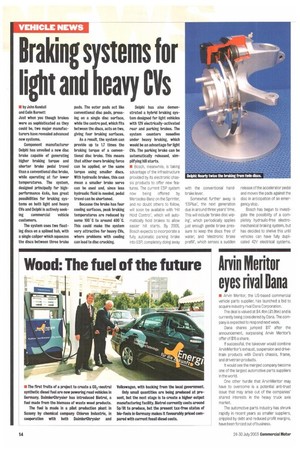Braking systems for light and heavy CVs
Page 14

If you've noticed an error in this article please click here to report it so we can fix it.
• by John Kendall and Cohn Barnett Just when you though brakes were as sophisticated as they could be, two major manufacturers have revealed advanced new systems.
Component manufacturer Delphi has unveiled a new disc brake capable of generating higher braking torque and shorter brake pedal travel than a conventional disc brake, while operating at far lower temperatures. The system, designed principally for highperformance 4x4s, has great possibilities for braking systems on both light and heavy Ws and Delphi is actively seek ing commercial vehicle customers.
The system uses two floating discs on a splined hub, with a single caliper which squeezes the discs between three brake pads. The outer pads act like conventional disc pads, pressing on a single disc surface, while the centre pad, which fits between the discs, acts on two, giving four braking surfaces.
As a result, the system can provide up to 1.7 times the braking torque of a conventional disc brake. This means that either more braking force can be applied, or the same torque using smaller discs. Wfth hydraulic brakes, this can mean a smaller brake servo can be used and, since less hydraulic fluid is needed, pedal travel can be shortened.
Because the brake has four cooling surfaces, peak braking temperatures are reduced by some 100' C to around 400'C. This could make the system very attractive for heavy eh, where problems with cooling can lead to disc cracking. Delphi has also demonstrated a hybrid braking system designed for light vehicles with 12V electrically-activated rear and parking brakes. The system counters nosedive under heavy braking, which would be an advantage for light CVs. The parking brake can be automatically released, simplifying hill starts.
• Bosch, meanwhile, is taking advantage of the infrastructure provided by its electronic chassis products to offer new features. The current ESP system now being offered by Mercedes-Benz on the Sprinter, and no doubt others to follow, will soon be available with 'Hill Hold Control', which will automatically hold brakes to allow easier hill starts. By 2005, Bosch expects to incorporate a fully automatic parking brake into ESP, completely doing away with the conventional nandbrake lever.
Somewhat further away is 'ESPlus', the next generation due in around three years' time. This will include 'brake disc wiping', which periodically applies just enough gentle brake pressure to keep the discs free of water, and 'electronic brake prefill', which senses a sudden release of the accelerator pedal and moves the pads against the disc in anticipation of an emergency stop.
Bosch has begun to investigate the possibility of a completely hydraulic-free electromechanical braking system, but has decided to shelve this until vehicles can have fully duplicated 42V electrical systems.




























































































































































